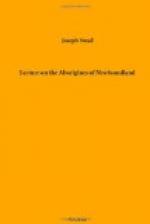they came up. Seven or eight Indians were then
seen repeatedly running off and on the pond, and shortly
three of them came towards the party—the
woman spoke to them, and two of the Indians joined
the English, while the third remained some one hundred
yards off. Something being observed under the
cassock of one of the Indians, he was searched and
a hatchet taken from him. The two Indians then
took hold of the man who had seized the Indian woman,
and endeavoured to force her away from him, but not
succeeding in this, he tried to get possession of
three different guns, and at last succeeded in geting
hold of one, which he tried to wrest from the man
who held it; not being able to accomplish this, the
Indian seized the Englishman by the throat, and the
danger being imminent, three shots were fired, all
so simultaneously that it appeared as if only one
gun had been discharged. The Indian dropped,
and his companions immediately fled. In extenuation
of this, to say the least of it, most deplorable event,
it is said, “could we have intimidated him, or
persuaded him to leave us, or even have seen the others
go off, we should have been most happy to have been
spared using violence—but when it is remembered
that our small party were in the heart of the Indian
country, a hundred miles from any European settlement,
and that there were in our sight at times, as many
Indians as our party amounted to, and we could not
ascertain how many were in the woods that we did not
see, it could not be avoided with safety to ourselves.
Had destruction been our object, we might have carried
it much farther.”
The death of this Indian was subsequently brought
before the Grand Jury, and that body having enquired
into the circumstances connected with it, in its report
to the Court makes the following statement:—“It
appears that the deceased came to his death in consequence
of an attack on the party in search of them, and his
subsequent obstinacy, and not desisting when repeatedly
menaced by some of the party for that purpose, and
the peculiar situation of the searching party and
their men, was such as to warrant their acting on
the defensive.”
Now, taking the foregoing report as given by the leader
of the expedition, and in which there can be no question
but that the conduct of the English party is as favourably
represented as it possibly could be, yet does the
statement detailed afford no excuse for the Indian,
and is the word “obstinacy” as applied
by the Grand Jury, applicable to him?
It may not be forgotten that the Indian was surprised
in the “heart of his own country”—treading
his own soil—within sight of his home—that
home was invaded by armed men of the same race with
those who had inflicted on his tribe irreparable injuries—his
wife was seized by them—his attempts to
release her, which ought to have been respected, were
violently resisted,—and then, maddened by
the bonds and captivity of his wife, he continues,
with a courage and devotion to her which merited a




